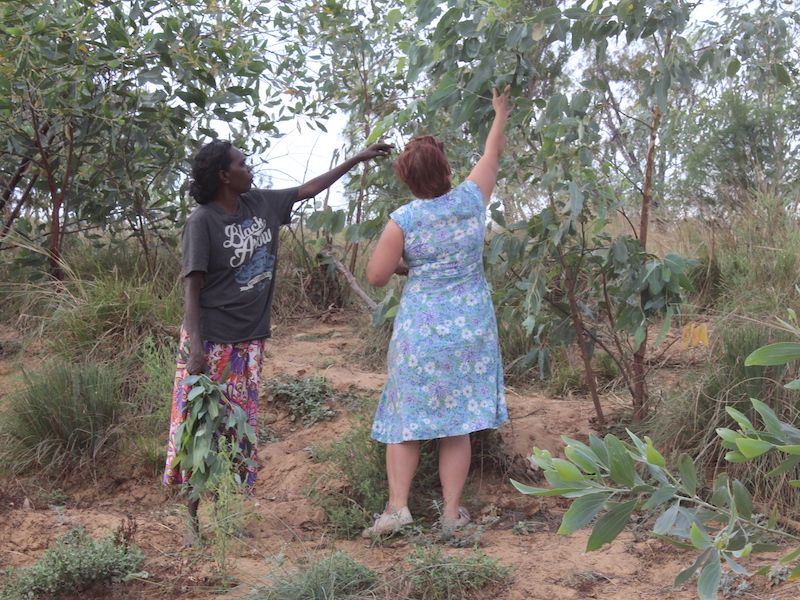Researcher Highlights
Aboriginal health research led by communities
Kate Senior
As a medical anthropologist, Kate makes space for community stories to be told. Her community-led research projects are helping to support the capacity, health and wellbeing of young people and remote Aboriginal communities in the Northern Territory.

Dr Kate Senior lives and breathes anthropology, having always been interested in culture and the myriad of ways people live their lives.
Heavily guided by community voices, her two primary areas of research include the health and wellbeing of people living in remote Aboriginal communities in the Northern Territory, and the sexual health of Indigenous and non-Indigenous young people.
“Over my career, I have worked to demonstrate the importance of anthropology in health settings and the contributions that anthropological insights can make to multidisciplinary projects.
“During this time, my research direction has changed from a focus on people’s understanding of health and illness, and their use of health services, to my current work which is driven by the community and examines issues that the community thinks are essential for health and wellbeing.”
Kate grew up in remote Australia and undertook PhD research in Ngukurr, South East Arnhem Land, Northern Territory, which has now been her home for more than 20 years.
“My husband, children and I consider our Ngukurr family to be an extension of our own. I sincerely hope that my work has made a difference to the Ngukurr community.”
Stories of strength and resilience
Kate perceives that remote Aboriginal communities are often framed by their deficits, by what they lack when compared to non-Indigenous communities. Her work aims to reframe this discourse and bring the strengths and resilience of Aboriginal communities into the public discourse, both through her writing and teaching.
“There are numerous strengths inherent in community life: people’s connection to family, their support for each other, their love of the land they live on and their immense pride in these connections.”
Some of Kate’s more recent projects have explored the meaning of living on country, in smaller communities known as outstations, and how living on an outstation influences health in the broadest possible way.
Another project aimed to reconnect the community with their artefacts held in the Melbourne Museum. Recently, Kate has also worked with Ngukurr elders to document stories about the old wrecked cars in their community.
“These wrecked cars, contrary to an outsider’s view of them as ‘rubbish’, embody important stories about the community’s history and struggles.”
Kate is especially proud of her role in establishing the Ngukurr News, a community newspaper and what she calls her “lasting legacy”. The newspaper is now entirely run by the community under the editorship of Daphne Daniels.
“The Ngukurr News provides a way to keep people informed about what is happening along with opportunities for young people to work on a project that is visible and respected.
“Through my work, I have always endeavoured to provide opportunities and support for disadvantaged and often disengaged young people to have a voice. I have done this through ensuring that they are employed and trained as peer researchers and that they are involved in projects which communities respect, such as the Ngukurr News.”
Innovative, research-based solutions
Kate was the Chief Investigator of an Australian Research Council (ARC) Linkage Project, ‘Culture, context and risk’, which explored young people's understanding of relationships and sexual risk in the Northern Territory, South Australia and Western Australia.
The results of this research have informed policy in Australia relating to sexual health and sex education. From 2017 to 2018, Kate collaborated with NSW Health’s HIV and Related Program Unit to translate the research results into an educational resource for young people.
The team created ‘Life Happens’, a sexual health game that is now widely used in schools and other youth-focused organisations across Australia.
“I’m proud that my work on young people’s sexual decision making, sexual health and understanding of sexual violence has been influential at a national and also an international level.”
To boost young people’s engagement in research, Kate has employed a wide range of arts-based research methods. These have included body mapping, photo voice and community mapping. Kate shares that the results produced by these methods are both a source of pride for their creators and an important catalyst for further discussion.
Community partnership is key
Kate’s inspirational research is creating a significant impact on policies and health services in Australia, helping to combat challenges such as petrol sniffing and more. However, the highly collaborative nature of her research means that the process is often just as powerful as the results.
Across all her work, Kate is committed to working in close partnership with Aboriginal people and communities. She is careful to create space for people’s voices to be heard, for their stories to be told, and for their strengths to be respected.
“I feel very proud of the long-term relationships that I have established through my anthropological work in the Northern Territory.
“The strength of these relationships means that community members are now guiding me into developing projects that interest them, or have meaning to the community, and my work continues to reflect their interests.”
The University of Newcastle acknowledges the traditional custodians of the lands within our footprint areas: Awabakal, Darkinjung, Biripai, Worimi, Wonnarua, and Eora Nations. We also pay respect to the wisdom of our Elders past and present.